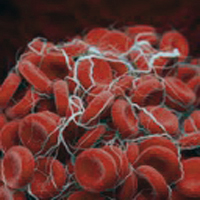Treatment and secondary prophylaxis of venous thromboembolism with direct oral anticoagulants in patients with severe hereditary thrombophilia

All claims expressed in this article are solely those of the authors and do not necessarily represent those of their affiliated organizations, or those of the publisher, the editors and the reviewers. Any product that may be evaluated in this article or claim that may be made by its manufacturer is not guaranteed or endorsed by the publisher.
Authors
Deficiency of protein C (PC), protein S (PS), antithrombin III (AT III), and homozygosity or combined heterozygosity for Factor V Leiden (FVL) and Factor II (FII) 20210A mutation represent severe hereditary thrombophilia (SHT) and are associated with a higher risk of early-onset venous thromboembolism (VTE). In literature, few papers have described the efficacy and safety of therapy with direct oral anticoagulants (DOACs) in VTE occurring in patients with SHT. In our setting, we identified 8 patients who have suffered from early-onset VTE and underwent therapy with DOACs (6 rivaroxaban, 2 apixaban). Among them, 2 AT III deficiency, 2 PC deficiency, 3 PS deficiency, 1 combined heterozygosity for FVL, and FII 20210A were detected. During the follow-up, neither recurrences of VTE nor hemorrhagic episodes were observed. This report describes the efficacy and safety of therapy with anti-Xa in the treatment and secondary prophylaxis of VTE in patients with SHT.
How to Cite
PAGEPress has chosen to apply the Creative Commons Attribution NonCommercial 4.0 International License (CC BY-NC 4.0) to all manuscripts to be published.






